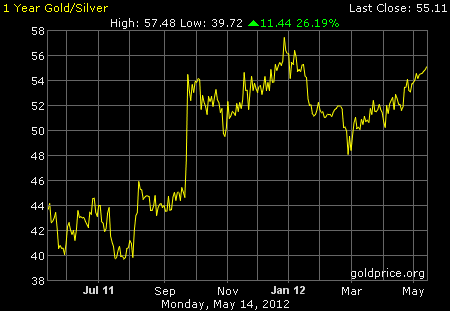Euro Price of Gold Hits Third Record in Three Days
London Gold Market Report
from Ben Traynor | BullionVault
Wednesday 25 May, 08:00 EDT
Euro Price of Gold Hits Third Record in Three Days as ECB “Basically Trapped” by “Horror Scenario” of Greek Default
U.S. DOLLAR gold prices rose to a three-week high of $1528 an ounce Wednesday morning London time, while commodity markets – like global stock markets – failed to add significantly to the gains they made Tuesday after Goldman Sachs issued a bullish note on the sector.
The London Fix on Wednesday morning saw Sterling gold prices set at £942, two pounds below Tuesday afternoon’s new all-time record.
Euro gold prices hit another new record – the third in three days – at €1084 an ounce.
“If we restructure Greek debt, that means Greece defaults,” said Christian Noyer, governor of the Banque de France and a member of the European Central Bank’s governing council, to journalists in Paris on Tuesday, describing the idea of Greek restructuring as a “horror scenario”.
The Greek government was forced on Wednesday to deny rumors that it was about to call a snap election.
If Greek debt were restructured, the ECB would no longer be able to accept Greek government bonds as collateral for loans, warned Juergen Stark – another executive board member – last week.
“They are now like many people in the banking system in calling out for no debt repudiation because they are so exposed,” says Charles Wyplosz, professor of International Economics at the Graduate Institute in Geneva, quoted by the Financial Times.
“The ECB is basically trapped,” says Wyplosz, as it has bought a large amount of Greek government debt through its asset purchase program.
“There is so much uncertainty [in the Eurozone] that the downside risk for gold prices is low in the short term,” says Andrey Kryuchenkov, London-based analyst at VTB Capital.
“People are still frightened about Portugal and about a possible restructuring of the Greek debt, so safe-haven flows will continue.”
Also in Paris, French finance minister Christine Lagarde – who in February pledged that other Eurozone members “won’t abandon Greece” – officially announced her candidacy to become the next managing director of the International Monetary Fund (IMF) on Wednesday.
“It is an immense challenge which I approach with humility and in the hope of achieving the broadest possible consensus,” said Lagarde.
But IMF executive directors from the BRICS countries – Brazil, Russia, India, China and South Africa – issued a joint statement Tuesday criticizing the “obsolete convention” that the head of what’s often called “the central banks’ central bank” should be a European.
Away from the Eurozone crisis, Goldman Sachs – which last month warned that “demand destruction” could see commodity prices fall – appeared to do a volte face on Tuesday, when it raised its price forecasts for the sector.
“We continue to expect that economic growth will likely be enough to tighten key supply-constrained markets,” it said in a report.
“We expect gold prices to continue to climb in 2011 as the resumption of quantitative easing should keep US real interest rates low.”
“Silver [also] appears to be making a tentative recovery,” says one London bullion dealer, who expects silver prices to hit resistance around $39.
Axel Rudolph and Karen Jones, technical analysts at Commerzbank, agree, predicting resistance at Silver’s 55-day moving average of $38.95.
Silver prices today gained over 2% to climb above $37 an ounce.
Goldman Sachs’ note predicted real interest rates would begin to rise in 2012, “likely causing gold prices to peak”. But “even if we remove some accommodation, policy will still be very easy,” Federal Reserve Bank of St Louis president James Bullard said earlier this week.
The Fed’s $600 billion asset purchasing program – widely known as QE2 – is due to end next month.
“We still have a considerable way to go to meet the Fed’s dual mandate of full employment and price stability,” said New York Fed president William Dudley last week, while Chicago Fed president Charles Evans has said monetary accommodation ought to remain “substantial”.
Ben Traynor
BullionVault




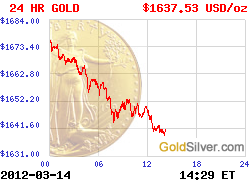
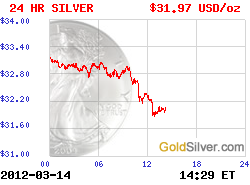
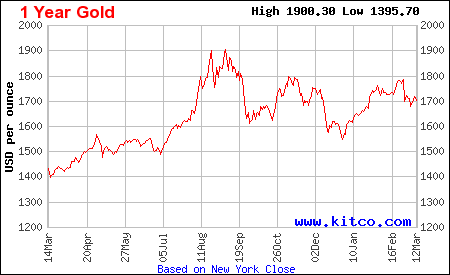 More Charts: 1-Month, 1-Year, 5-Year, 10-Year
More Charts: 1-Month, 1-Year, 5-Year, 10-Year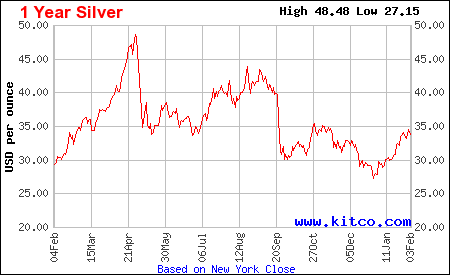 More Charts: 1-Month, 1-Year, 5-Year, 10-Year
More Charts: 1-Month, 1-Year, 5-Year, 10-Year